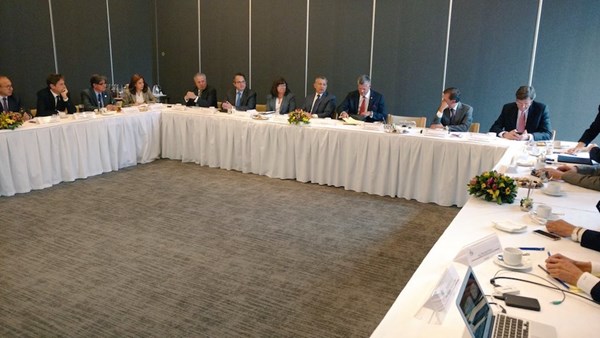Canadian, Mexican and U.S. Plastics Organizations Meet to Modernize NAFTA
The heads of PLASTICS, CPIA and ANIPAC met this week in Mexico City to reexamine the trade deal 24 years after it passed and before President Trump focuses on it.
Leaders from the Plastics Industry Association (PLASTICS), Canadian Plastics Industry Association (CPIA) and Mexico’s national plastics association, ANIPAC, held what PLASTICS President and CEO Bill Carteuax called a “marathon session” on July 5 to seek ways to update the North American Free Trade Agreement, which turns 25 next year.
Just boarded a flight to Mexico City for a Plastics NAFTA Summit with our friends from Canada ¤ć©¤ć” and Mexico ¤ć▓¤ćĮ.
— Bill Carteaux (@bcarteaux)
Finished marathon session with @CPIA_ACIP and on modernizing NAFTA for the N.A. Plastics Industry. Outcome tomorrow! pic.twitter.com/9GIfPsqaTj
— Bill Carteaux (@bcarteaux)
These associations, all of which have seen their domestic plastics industries benefit from NAFTA, are bringing focus to the issue ahead of U.S. President Donald Trump’s calls to renegotiate the deal. Trump formally launched a renegotiation of NAFTA in May, walking back some of his . I looked at the potential impact of Trump following up on his campaign rhetoric regarding NAFTA back in December.
Right on its website, PLASTICS spells out its support of trade liberalization globally as a means to benefit the U.S. plastics industry:
The Plastics Industry Association (PLASTICS) supports the U.S. government’s efforts to achieve trade liberalization abroad that allows U.S. plastics manufacturers to expand their sales and operations. As part of its International Trade Policy, PLASTICS urges the government to engage in a comprehensive approach to reducing and eliminating foreign trade barriers.
In June, the German Plastics Machinery Association (VDMA) released its most recent trade data, pointing out strong growth in many areas, including the U.S. (its top market; Trump took issue with the ). VDMA also noted that Britain, which unilaterally pulled out of the European Union, an agreement which had given it unfettered trade access to the continent, was already seeing the effects of its “Brexit”. Great Britain is working to renegotiate individual trade deals with its European partners.
“In Britain, on the other hand, the effects of Brexit are slowly being felt,” says Thorsten Kühmann, Managing Director of the VDMA Plastics and Rubber Machinery Association in his trend analysis. Exports fell in the first quarter by 31 per cent, resulting in that market dropping from 4th to 8th place among the major plastics and rubber machinery buying countries.
In more recent days, Germany has talked about direct trade deals with and , opening itself up as the U.S. appears to hunker down. One can hope the hard work by the leadership of PLASTICS, CPIA and ANIPAC will help the Trump administration see the value in NAFTA.

Related Content
-
US Merchants Makes its Mark in Injection Molding
In less than a decade in injection molding, US Merchants has acquired hundreds of machines spread across facilities in California, Texas, Virginia and Arizona, with even more growth coming.
-
Medical Tubing: Use Simulation to Troubleshoot, Optimize Processing & Dies
Extrusion simulations can be useful in anticipating issues and running “what-if” scenarios to size extruders and design dies for extrusion projects. It should be used at early stages of any project to avoid trial and error and remaking tooling.
-
Paperless ‘Smart Factory’ Based on Automated Production Monitoring
Tier 1 automotive molder’s home-built production-monitoring and ERP systems, designed for “the little guy,” boost its efficiency rating and profits.







